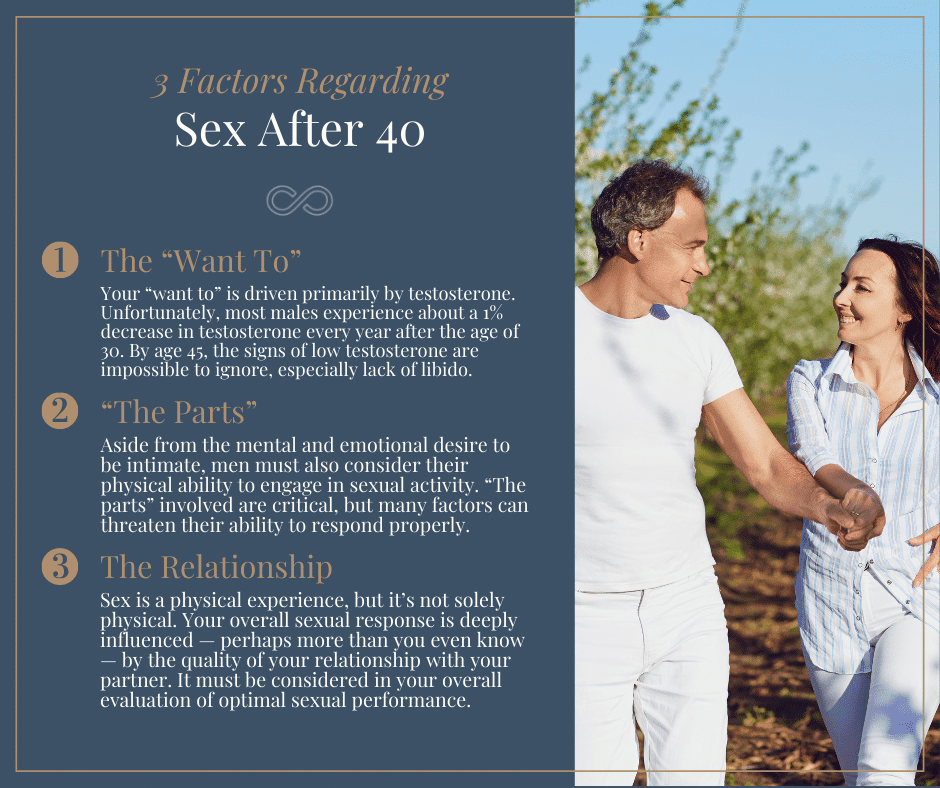Download file | Play in new window |
We live in a culture dominated by sex, but rarely do we approach the topic of intimacy with the authentic, honest perspective it deserves. Sex is a marketing tool and a movie cliche, but it’s also a cornerstone of your relationships and overall wellbeing.
If you can see your thirties in the rearview mirror and you’re wondering how to embrace a healthy sex life after 40, it’s time to get honest with yourself. When I speak to my patients about sex, I frame the conversation in three categories: the desire to have sex, the physical ability to have sex, and the quality of your relationship with your partner.
Men and women alike struggle to view sex and intimacy from this framework. In fact, they struggle to discuss sexual health at all. Our society is comfortable joking about and flaunting sex, but it’s so much harder to get real about the issues we face.
Instead of using sex as clickbait, we need to address it just like any other health factor. Intimacy is part of a healthy romantic relationship, so discussing sex (and its challenges) should be just as natural as discussing your sleeping habits or exercise goals. Let’s begin to give your sex life after 40 more attention in the most authentic way possible.
The “Want To”
Some call it libido. Others know it as lust. I call it the “want to”: the inherent desire to pursue and enjoy sex.
Your “want to” is driven primarily by testosterone. Adolescent boys and young men don’t have to think twice about their testosterone levels; they effortlessly enjoy a surplus of the hormone. You probably remember your own experience as a 20-year-old college student who felt invincible. You were at your fastest, strongest and most energetic.
Unfortunately, most males experience about a 1% decrease in testosterone every year after the age of 30. Many men enter their forties feeling like the passion of their twenties occurred a lifetime ago. By age 45, the signs of low testosterone are impossible to ignore, especially lack of libido.
Here’s the good news: low testosterone isn’t a life sentence. Bioidentical hormone replacement therapy (BHRT) makes it easy to quickly optimize and equalize your testosterone levels. In the hands of a responsible medical provider, you can identify your ideal testosterone levels and use BHRT to significantly improve your “want to.”
How Performance Anxiety Impacts Your Desire
It’s also possible that your lack of “want to” isn’t directly caused by low testosterone. Performance anxiety is an insidious issue that lurks under the surface. Even men with high levels of self-awareness may struggle to identify and cope with their performance anxiety.
I’ve observed this issue develop as the result of poor work/life balance, chronic stress and other all-consuming challenges. When performance anxiety develops, it creates such angst that men avoid sex altogether in an effort to prevent that devastating sense of doubt and failure.
If your doctor confirms you have healthy testosterone levels, but your libido is still at zero, consider taking measures to manage your stress. Escape on a vacation, set boundaries at work, or find a therapist you trust to work through unresolved trauma. Once you find the key to defining and defeating your performance anxiety, you can unlock the desire you’ve been bottling up for so long.
“The Parts”
Aside from the mental and emotional desire to be intimate, men must also consider their physical ability to engage in sexual activity. “The parts” involved are critical, but many factors can threaten their ability to respond properly.
Low testosterone and reduced blood flow are the most common sources of sexual dysfunction problems like erectile dysfunction. The following factors significantly increase your risk for this condition:
- Smoking
- Hypertension
- Type 2 diabetes
- Obesity
- Prescription medication use, especially for blood pressure and depression
- Excessive alcohol consumption
The wear and tear of age may also compromise your body’s sexual response, but since age isn’t within your control, concentrate on addressing the risk factors you can impact. This advice is no different than the instructions your doctor would give you to fight any other health problem. So stop smoking, control your diabetes, explore alternative medications, and take action to lose weight.
The Relationship
The “want to” and “parts” of sex don’t receive enough attention, but they still receive more acknowledgment of another category of sexual health: your relationship.
Sex is a physical experience, but it’s not solely physical. Your overall sexual response is deeply influenced — perhaps more than you even know — by the quality of your relationship with your partner. It must be considered in your overall evaluation of optimal sexual performance.
If your testosterone levels are sufficient and your “parts” are working fine, but you’re still underperforming in the bedroom, your relationship is the last remaining variable. And it comes down to quality.
I know it’s challenging to look in the mirror and make an honest evaluation of something so deeply personal. But if you continue to sweep deep-seated issues under the rug, you’ll never find a resolution.
Perhaps it’s unspoken hurt, longstanding trauma, or chronic disagreements. Whatever the origin, you must start by identifying it. Then, if you truly want to improve your sexual performance in that relationship, you must commit to healing the fractures.
You and your partner should agree on some terms that are acceptable to you both as you work on healing your relationship. If you can reach terms you both agree on, they’ll facilitate the healing that’s the cornerstone to improving the quality of your relationship.
Men often benefit from a multi-layered approach during this time. They actively pursue healing in their relationships while controlling modifiable risk factors and using testosterone therapy. The combination of three such powerful actions has the potential to transform your sex life.
If you take all these steps and still don’t achieve the results you’re seeking, or you and your partner can’t reach mutually acceptable terms for your relationship, you have a choice. You can either accept the status quo, or end the relationship. It’s impossible to navigate the human experience at the highest and most rewarding level when your most intimate relationship isn’t thriving.
Only you know what’s right for you, but it helps to consult with a trusted physician and explore every avenue toward sexual health and satisfaction. Turning 40 doesn’t automatically spell doom for your sex life. In fact, with the right guidance and medical advice, you can enjoy more satisfaction in the bedroom than ever before.

Dr. Aaron Wenzel is a concierge physician specializing in the care of fast-moving entrepreneurs, executives, and public figures in the Nashville, TN area. Dr. Wenzel’s diverse life experience and extensive training in family medicine, emergency care, nutrition, and hormone replacement therapies give him the unique platform to provide unmatched care for his patients.







